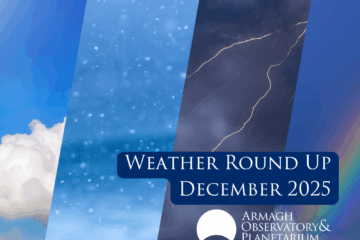DECEMBER 2019 WARMER AND SUNNIER THAN AVERAGE WITH SLIGHTLY LESS RAINFALL. CALENDAR YEAR 2019 WARMER, SLIGHTLY WETTER, AND DULLER THAN AVERAGE
Armagh Observatory reports that December 2019 was warmer and sunnier than average and with slightly less rainfall. Taken as a whole, calendar year 2019 at Armagh was warmer and slightly wetter than average and, with fewer than average hours of strong sunshine, rather dull.
Total December precipitation was 75.20 mm (2.96 inches) including 8 trace values, or 74.6 mm if trace values are ignored. This is nearly 3% less than the average December rainfall at Armagh, making this month slightly drier than average. This was the driest December at Armagh for three years, that is, since December 2016. The wettest day was the 18th with 17.2 mm (0.68 inches) of rainfall. It is interesting to note that a brief shower of rain, sleet and snow was reported at around 01:40 on the morning of the 14th. A rainbow was noticed at around 10:40 on the 23rd.
With a total of 46.8 hours of strong sunshine, December 2019 was sunnier than average with approximately 15% more strong sunshine than the average December at Armagh. This was the sunniest December at Armagh for three years, that is, since December 2016. The sunniest day was the 3rd with 5.5 hours of strong sunshine, followed by the 16th with 5.3 hours.
December 2019 was also warmer than average, with a mean monthly temperature of approximately 6.0 degrees Celsius (42.8 degrees Fahrenheit). This is 1.45 C warmer than the than the long-term (1796–2010) average December temperature at Armagh, and 1.10 C more than the most recent (1981–2010) 30-year average for December at Armagh.
The warmest day (highest maximum air temperature) was 13.1 C on the 10th, followed by 12.5 C on the 5th, and the coldest day (lowest maximum air temperature) was 3.9 C on the 15th, followed by 5.1 C on both the 14th and 17th. The warmest night (highest minimum air temperature) was 9.6 C on the 29th, preceded by the second-warmest night, namely 9.3 C on the 28th. The coldest night (lowest minimum air temperature) was -2.1 C on the 18th followed by -0.5 C on the 31st. There were 18 ground frosts, the coldest of which was -10.8 C on the 25th, and three nights with air frost (minimum air temperature less than or equal to zero).
Taking the year as a whole, calendar year 2019 at Armagh was warmer and slightly wetter than average, but with fewer than average hours of strong sunshine. However, such a general statement masks substantial month-to-month and seasonal variations, the wider significance of which are difficult to establish over short timescales, for example those less than the conventional 30-year intervals used by meteorologists in discussions of climate change. This highlights the importance of maintaining long-term records such as those held at Armagh Observatory.
So far as 2019 as a whole is concerned, the annual mean temperature was 10.24 C (50.4 F). This is 1.18 C warmer than the long-term (1796–2010) average annual temperature at Armagh and 0.53 C warmer than the most recent (1981–2010) 30-year average. This was the ninth-warmest year on record at Armagh, that is, since daily temperature measurements began at the Observatory in December 1794. Of the 20 calendar years from 2000 to 2019 inclusive, more than half (i.e. 12) have recorded an average annual temperature of 10.0 C or more, though the warmest three years at Armagh, namely 2007, 2006 and 1949, all occurred more than a decade ago.
Total precipitation was 866.90 mm (34.13 inches) including 62 trace values, making calendar year 2019 the wettest at Armagh for four years. Ignoring trace values, the year provided approximately 6.5% more precipitation than the long-term (1838–2010) average total annual rainfall at Armagh (814.29 mm). It is noteworthy that despite what are typically quite large variations in rainfall from month to month and from year to year, the total annual precipitation at Armagh, like that for sunshine but unlike that for temperature, shows no strongly increasing or decreasing trend over timescales of the order of a hundred years or more.
Calendar year 2019 was rather duller than average with recorded strong sunshine hours totalling 1202.7 during the year. This is 88.3% of the long-term (1881–2010) average annual sunshine at Armagh and 96.4% of the most recent (1981–2010) average. This was the dullest calendar year at Armagh for 14 years, that is, since a total of 1170.6 hours of strong sunshine were recorded in 2005.
These data refer to observations at Armagh Observatory, which has been recording the weather at Armagh since 1795.
FOR FURTHER INFORMATION PLEASE CONTACT: Mark Bailey at the Armagh Observatory, College Hill, Armagh, BT61 9DG. Tel.: 028-37522928; FAX: 028-3752-7174; mark.bailey@armagh.ac.uk; URL: http://climate.arm.ac.uk/.



0 Comments